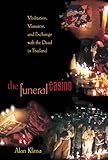The Funeral Casino : Meditation, Massacre, and Exchange with the Dead in Thailand / Alan Klima.
Material type: TextPublisher: Princeton, NJ : Princeton University Press, [2009]Copyright date: ©2002Edition: Course BookDescription: 1 online resource (336 p.)Content type:
TextPublisher: Princeton, NJ : Princeton University Press, [2009]Copyright date: ©2002Edition: Course BookDescription: 1 online resource (336 p.)Content type: - 9780691074603
- 9781400824960
- 959.304
- online - DeGruyter
- Issued also in print.
| Item type | Current library | Call number | URL | Status | Notes | Barcode | |
|---|---|---|---|---|---|---|---|
 eBook
eBook
|
Biblioteca "Angelicum" Pont. Univ. S.Tommaso d'Aquino Nuvola online | online - DeGruyter (Browse shelf(Opens below)) | Online access | Not for loan (Accesso limitato) | Accesso per gli utenti autorizzati / Access for authorized users | (dgr)9781400824960 |
Frontmatter -- Contents -- Illustrations -- Note on Transcription and Monetary Conversion -- Acknowledgments -- Chapter 1. Introduction -- Part I. The Passed -- Chapter 2. The New World -- Chapter 3. Revolting History -- Chapter 4. Bloodless Power -- Chapter 5. Repulsiveness of the Body Politic -- Part II. Kamma -- Chapter 6. The Charnel Ground -- Chapter 7. The Funeral Casino -- Notes -- Bibliography -- Index
restricted access online access with authorization star
http://purl.org/coar/access_right/c_16ec
The Funeral Casino is a heretical ethnography of the global age. Setting his book within Thailand's pro-democracy movement and the street massacres that accompanied it, Alan Klima offers a strikingly original interpretation of mass-mediated violence through a study of funeral gambling and Buddhist meditation on death. The fieldwork for the book began in 1992, when a freewheeling market of illegal "massacre-imagery" videos blossomed in Bangkok on the very site where, days earlier, for the third time in two decades, a military-controlled government had killed scores of unarmed pro-democracy protesters. Such killings and their subsequent representation have lent force to Thailand's transition from military control to a "media-financial complex." Probing the ways in which death is marketed, visualized, and remembered through practices both local and global, Klima inverts conventional relationships between ethnography and theory through a compelling narrative that reveals a surprising new direction available to anthropology and critical theory. Ethnography here engages with the philosophy of activism and the politics of memory, media representation of violence, and globalization. In focusing on the particular array of tactics in Thai Buddhism and protest politics for connecting death and life, past and present, this book unveils a vivid and haunting picture of community, responsibility, and accountability in the new world order.
Issued also in print.
Mode of access: Internet via World Wide Web.
In English.
Description based on online resource; title from PDF title page (publisher's Web site, viewed 30. Aug 2021)


